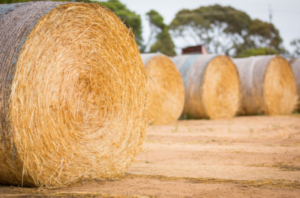Baling twine is a vital component of making durable bales. It is also used to mend fences, reattach tractor parts and more.
Polypropylene baler twine is explicitly designed for use with mechanical baling machines. It is a strong twine that resists knot slippage and ensures high press density and efficiency. It is available in several colours and is treated with UV additives to adapt it to the region of use.
Product Description
Twine isn’t just used to tie hay bales and mend fences, reattach tractor parts, and steady a gate. Polypropylene baler twine (also known as binder twine) is tough, durable and easy on the hands. It’s moisture-resistant, won’t rot or mildew and isn’t brittle.
 We offer a variety of twine colours, so you can choose a specific hue to identify each paddock, cutting, field or year. You can also use the colour of your twine to track baling progress and easily see when it’s time to reload the machine. Each spool has 110 lb knot strength and is UV-treated for longer life and sold by the bale – 20,000′ total length.
We offer a variety of twine colours, so you can choose a specific hue to identify each paddock, cutting, field or year. You can also use the colour of your twine to track baling progress and easily see when it’s time to reload the machine. Each spool has 110 lb knot strength and is UV-treated for longer life and sold by the bale – 20,000′ total length.
Applications
When used in a baler, polypropylene twine is durable and can withstand the stresses of making round bales. It’s rot and mildew-resistant, does not cling to dirt or swell in water, is non-toxic, and will not degrade under regular exposure to sunlight and moisture. For more information about the polypropylene baler twine, click here.
To prepare the twine, a strip or strips of unidirectionally oriented, predominantly isotactic, preferably internally lubricated, foamed polypropylene film is collapsed and twisted under conditions that set the twine. The resulting twine is prepared to have a minimum tensile strength of 110 pounds per inch and is generally soft enough to handle and knot easily.
For the best results, make sure that you choose the proper twine for your particular baler. Coastal has several options, including a made-in-the-USA option with guaranteed feet per carton. For example, our BridonMAX round, slit-film 110-weight twine comes in a 40,000-foot carton. One Lonely Farmer recently tested this and two other types of twines (Reyenvas Black Label Twine, PowerPress) using his baling machinery. Check out his full video to see the results.
Packaging
The twine can be recycled like other plastics –send it to your local recycling waste handler for collection. Alternatively, schools and art centres are happy to receive twine polypropylene for use in creative projects, so it can find new life after its use as baling twine.
It’s available in a choice of colours for easy identification so that you can use a different colour for each paddock, field, person cutting or year. It’s a great way to keep track of the twine for each bale, and it will resist abrasion from oil and grease. It’s guaranteed a certain number of feet per carton for peace of mind, with options from brands like BridonMAX.
Delivery
Twine is a must-have for any baler operator, whether binding stems in the garden or making big square hay bales. From sisal to poly, many options are available for your needs, including twine colours and tensile strength. Brands like BridonMAX make coastal’s selection of twine, and each product is guaranteed to have a specific number of feet per carton. For more information about the polypropylene baler twine, click here.
The synthetic twine is easy to work with and won’t rot, mildew or mould. It knots easily, holds tightly and won’t become brittle. It also resists abrasion, oil and grease.
The baler twine is recyclable but must be sent to a specialist recycling plant to be processed. Phs Waste Kit can help you find a recycling collection partner. You can also purchase a full range of baler and compactor accessories from phs Waste Kit to make recycling easier. For more information about the polypropylene baler twine and how you can benefit from it, click here.